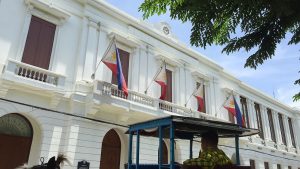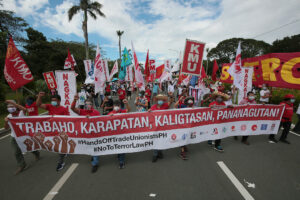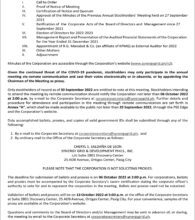Expanded public consultation sought on managing gov’t debt

By Kyle Aristophere T. Atienza, Reporter
CIVIL SOCIETY organizations (CSOs) need to be given a place at the table in determining how to deal with the national debt, after they were largely left out of discussions on the record levels of debt the current government has taken on, a think tank said.
The government has tended to exclude the broader public from discussions on public finances, leaving them uninformed of the costs of foreign-funded projects, according to Sonny A. Africa, executive director of think tank Ibon Foundation.
“Governments have for too long portrayed economic policymaking as the domain of experts and of finance in particular as its most rarefied realm,” he said in a Messenger chat. “This results in the broader public being excluded from vital decisions that bear on them, their livelihoods and their economic welfare.”
Failure to engage the public on the national debt and inform them of the consequences effectively excludes them from governance, Mr. Africa said.
“CSOs have long proven their ability to serve as organized channels of the broad public interest independent of vested political and economic interests,” he said. “Even just the presence of civil society in key decision-making bodies can go far in bringing the people’s perspective into the process and improving transparency.”
President Rodrigo R. Duterte will leave behind a record P12.76 trillion in debt when he steps down on June 30. Outstanding debt rose by 16.2% from a year earlier according to preliminary data from the Bureau of the Treasury.
“The public should be involved in decisions on national debt for the simple reason that it’s the public that pays for the national debt through their taxes and whatever the government earns using public assets and resources,” Mr. Africa said.
Sri Lanka has been rocked by weeks of protests after its government defaulted on a multi-million foreign debt payment, pushing its economy to the brink of collapse.
The Sri Lankan economic crisis was attributed to the government’s handling of the national debt, allegedly accompanied by corruption.
Sri Lanka’s economic crisis is a consequence of its government’s failure to ensure transparency and people’s participation in the management of national debt and public finances, said Rene E. Ofreneo, president of the Freedom from Debt Coalition.
In an e-mail, he called for “debt transparency — transparency in government plans to borrow and service debt, transparency on the rationale for borrowings and purposes, transparency in the selection of creditor institutions, transparency on the conditionalities and cost/terms of borrowings.”
Mr. Ofreneo noted that when the government went to the Asian Development Bank (ADB) in 2020 for a $1.5-billion budgetary support loan, both the bank and the Department of Finance (DoF) claimed that the debt scenario for the Philippines was “sustainable” and is not expected to exceed the debt-to-GDP threshold of 60%.
“But this was breached in 2021 and we are now headed towards mid-60%, with serious economic implications,” he said.
“It is our collective hope that President-elect Ferdinand R. Marcos, Jr. and DoF Secretary-designate Benjamin E. Diokno will be open to frank and sustained dialogue on debt and economic issues affecting the people within the framework of government and civil society organizations finding best solutions to our economic maladies.”
Mr. Ofreneo said the 1987 Constitution requires that information on foreign loans obtained or guaranteed by the government must be made available to the public.
“The essence of such a provision means not only full disclosure but also advance information sharing and consultation with the widest segments of the public,” he said.
Mr. Ofreneo, an academic, noted that the Philippines’ external debt under the leadership of Mr. Marcos’ late father, Ferdinand E. Marcos, Sr., drastically increased to $20 billion in 1980 from $2 billion in 1972, the year Martial Law was declared.
“A number of people were alarmed by the debt then. But technocrats serving in the Marcos dictatorship said there’s nothing to worry because the economy was growing and the growth can pay for the debt,” Mr. Ofreneo said separately by telephone. “People were not informed of the growing external debt at that time and look where we are now.”
He said good public financial management that consultants broadly is required by democratic governance.
Terry L. Ridon, a former legislator and public investment expert, said the public should not concede the management of the country’s public debt to technocrats “as our current limited fiscal space has a direct impact on whether existing social programs for poor Filipinos will continue under a new government.”
“CSOs and grassroots organizations should actively engage with policymakers in both the executive and legislative branches to make sure that the core agenda of government remains to be poverty alleviation and job generation amid the continuing pandemic,” he said in Messenger chat.
This active engagement is critical in each step of the budget process to monitor appropriations that do not focus on a social development agenda “such as expanding funding to confidential and intelligence funds, and infrastructure projects which have been subjected to various controversies,” Mr. Ridon said.
“This is important because a peso given to unnecessary expenditure is a peso lost for social programs, such as conditional cash aid and free education.”
While there are provisions on transparency and accountability in the 2022 General Appropriations Act, there is currently no law ensuring that people’s organizations are involved in debt management, said Zyza Nadine Suzara, executive director at Institute for Leadership, Empowerment, and Democracy (I-Lead).
“This is perhaps one area that can be addressed through a Freedom of Information law,” she said in a Messenger chat.
Mr. Marcos has said a new stimulus measure will be among his priority bills for the incoming Congress, although potential revenue sources are still being studied.
Public finance experts have asked the Marcos team to clarify whether that plan would entail more foreign borrowing.
Members of the 19th Congress will take office on July 25, when Mr. Marcos delivers his first state of the nation address.




